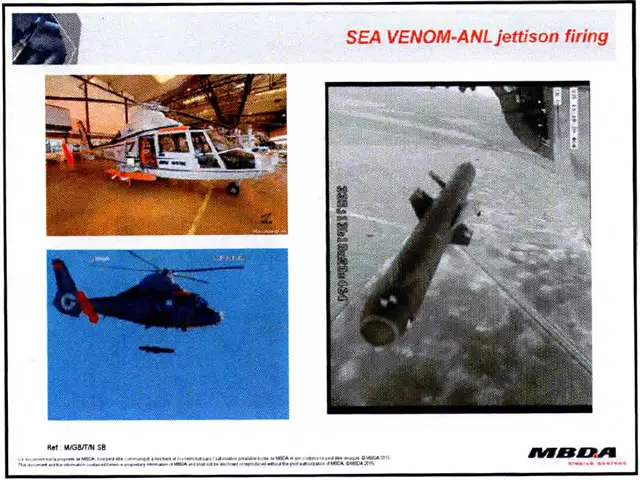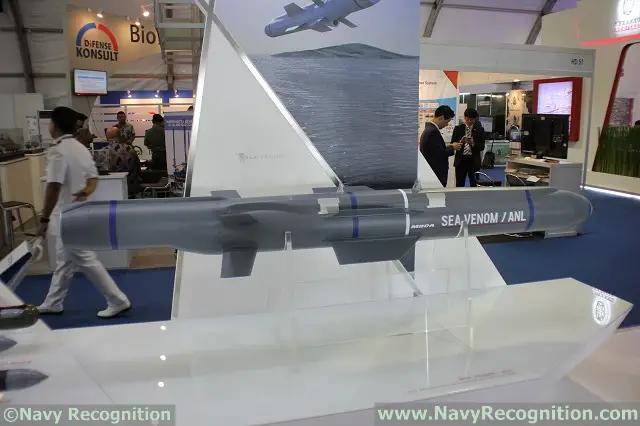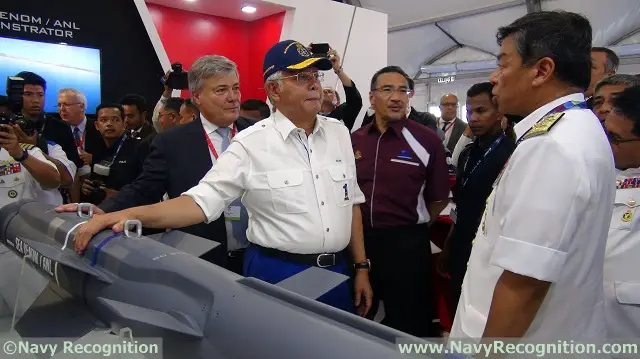Breaking news
LIMA 2017: MBDA Demonstrating the Deadly Strike of the Sea Venom.
| 2017
|
|
|||
 Sea Venom ANL jettison firing. Picture: MBDA Sea Venom ANL jettison firing. Picture: MBDA |
|||
|
|
|||
| Mark Sheehan from MBDA and a former RN Lynx pilot with firsthand experience of the Sea Skua missile said: ”Sea Skua is an excellent weapon with a commendable service record. However, a comparison with Sea Venom is the difference between night and day, literally. Sea Venom adds so much extra capability and is ideally suited to the Wildcat with its Seaspray AESA radar and Wescam optical/IR nose turret. For today’s evermore complex challenges, particularly in the littoral, Sea Venom adds a whole new aspect to what a naval helicopter can do, from taking out moored vessels in port through to fast moving vessels in open waters. Importantly, the operator can choose to stay in full control and contact with the missile right up to target impact”. Sea Venom is a high subsonic, sea skimming missile with a range of 20 Km designed for high lethal effect against a wide target set including FIACs (Fast Inshore Attack Craft) and corvettes. The missile is capable of several attack modes including ‘pop up / top attack’. A high speed, two-way data-link communicates the IR images, “seen” by the missile’s seeker, to the operator. Therefore, in addition to initiating an autonomous engagement, the operator can also monitor the action or even remain in control of the missile throughout the full duration of its flight. With aim-point selection, the operator can decide whether to destroy or disable the target. |
|||
|
|
|||
 Sea Venom on MBDA stand at LIMA 2017 Sea Venom on MBDA stand at LIMA 2017 |
|||
|
|
|||
| In addition to its operational advantages, and importantly for current Sea Skua users, Sea Venom retains the same dimensions, allowing for compatibility with existing magazines and handling equipment. Given that the UK and France will be supporting the weapon and its growth path over the next 30 years or so, Sea Venom customers can be confident in the durability of the capability provided. Similarly, as the Royal Navy is intending to deploy Sea Venom on its future AW 159 Wildcat, should the Royal Malaysian Navy move towards this platform, a seamless transition with Sea Venom is assured. | |||



























 Prime Minister, Minister of Defense of Malaysia and RMN Chief of Navy showing great interest for the Sea Venom on MBDA stand at LIMA 2017
Prime Minister, Minister of Defense of Malaysia and RMN Chief of Navy showing great interest for the Sea Venom on MBDA stand at LIMA 2017